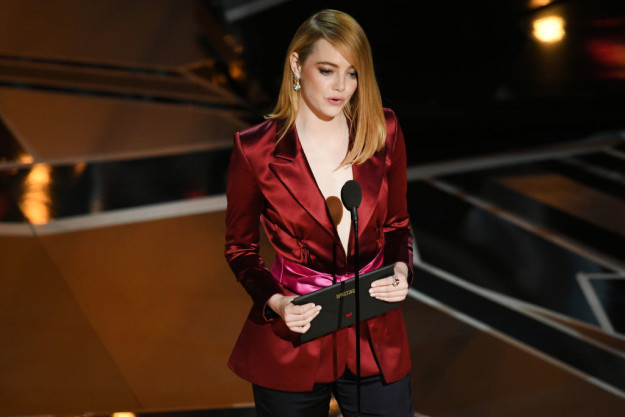
“All she did was minimize the achievements of the non-white male director nominees who worked so damn hard to get where they are.”
Emma Stone had the honor of introducing the nominees for the Best Director category at the 2018 Academy Awards, but a comment the Oscar-winning actor made during the broadcast about the overwhelmingly male line-up has caused a stir online.

BuzzFeed News has reached out to Stone’s representative for comment.
Kevork Djansezian / Getty Images
“It is the director whose indelible touch is reflected on every frame,” Stone began. “It is the director who, shot by shot, scene by scene, day by day works with every member of the crew to further the story.”

Kevin Winter / Getty Images
“And it is the vision of the director that takes an ordinary movie and turns it into a work of art,” Stone continued.
But the main point of contention came when Stone ended her introduction, saying, “These four men, and Greta Gerwig, created their own masterpieces this year.”

Guillermo del Toro ended up nabbing the award for Best Director, beating out stiff competition like Greta Gerwig (Lady Bird), Christopher Nolan (Dunkirk), Jordan Peele (Get Out), and Paul Thomas Anderson (Phantom Thread).
Kevin Winter / Getty Images
In early January at the Golden Globes, Natalie Portman made a similar comment, pointing out the all-male nominees in the directing category while presenting the award with Ron Howard.
“And here all the all male nominees,” Portman said flatly, right after Howard talked about how honored the two were to there to issue the award.
During that broadcast, del Toro (The Shape of Water), was the only person of color nominated and moments later went on to snag the top honor.
Spielberg (The Post), Christopher Nolan (Dunkirk), Martin McDonagh (Three Billboards Outside Ebbing, Missouri), and Ridley Scott (All the Money in the World) were the other nominees.
In 2014, the ACLU of Southern California and the national ACLU Women’s Rights Project found that women made up only 7% of the top-grossing Hollywood features.
And more recently, the USC Annenberg Inclusion Initiative, founded by Professor Stacy L. Smith to “advance equality in entertainment,” concluded that in addition to women being greatly underrepresented in film, the outlook is also grim for minority filmmakers.
“Only 5.2% of the 1,223 directors of 1,100 top films were Black, and 3.2% were Asian,” according to the initiative.
“This translates into 31 individual Black directors and 20 Asian directors of popular movies released from 2007 to 2017.”

